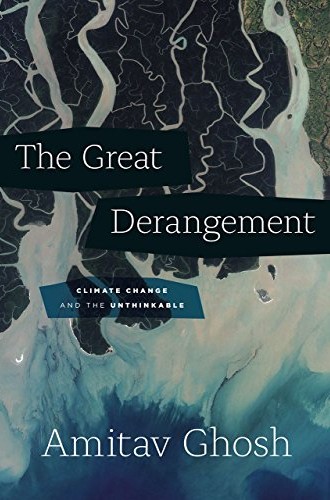The crisis we ignore
What would it take for us to stop denying climate change—and to find reasons for hope?
I still occasionally attend lectures at my alma mater, the University of Chicago. During these talks, I frequently find myself frustrated, lost in the intricacies of the argument. But usually near the end of the lecture I experience a moment of insight where the big picture is suddenly clear. (It doesn’t always work that way. I recall one talk in which the lecturer used the phrase “the ontological destruction of Augustine by Heidegger in 1927.” I spent the rest of the lecture wondering how a mere mortal like Heidegger could ontologically destroy a human who had already been dead for nearly 1500 years. That day my moment of insight never came.)
If I had attended the four lectures on climate change that the novelist Amitav Ghosh delivered at the University of Chicago in 2015—which later evolved into this book—I suspect the balance would have been tipped toward more insights and fewer frustrations. It’s a dense book, and it circles around several topics. But it is also elegantly composed and compellingly argued. Ghosh’s diagnosis is blunt. “We are mired in the Great Derangement: our lives and our choices are enframed in a pattern of history that seems to leave us nowhere to turn but toward our self-annihilation.”
In 1978, as a graduate student in Delhi, Ghosh found himself in the path of a freak tornado. So why, he asks, hasn’t he written about extreme climate events in any of his novels? As he examines cultural perceptions of the natural world in relation to climate change, he explains how literary fiction came to avoid depicting the uncanny, the nonhuman, the improbable, and the aggregate—all of which characterize extreme weather events.
But it’s not just novelists who are in denial about climate change. Ghosh’s exploration of the complex relationship between British imperialism and Asia’s slow entry into the carbon economy exemplifies how our oversimplified constructions of history can be as deranged as our literature. While many analysts suggest that our lack of will in fighting climate change can be explained by economic factors (i.e., we are too greedy to be willing to change our lifestyle in any radical way), Ghosh demonstrates that an equally significant factor is empire. Political power and the control of carbon-emitting industries are more closely linked—and have been for centuries—than most histories of global warming admit.
Against the idol of “individual moral adventure” that characterizes our literature, our history books, and our political dreams, Ghosh portrays anthropogenic climate change as a collective reality that transcends time and space, “the product of the totality of human actions over time.” He shows that the U.S. military recognizes the borderless dimensions of climate change in a way that other branches of our government have been slow to accept. “We are in an era when the body of the nation can no longer be conceived of as consisting only of a territorialized human population: its very sinews are now revealed to be intertwined with forces that cannot be confined by boundaries.” (Think of the current Syrian refugee crisis, and recall that Syria’s civil war was preceded by years of famine that scientists have connected to global climate change.)
Ghosh finds hope in art’s tendency to envision possibilities, “to approach the world in a subjunctive mode, to conceive of it as if it were other than it is.” And although he implicates Protestantism in creating the trap of individual moral adventure, with its beliefs in “perfectibility, individual redemption, and a never-ending journey to a shining city on a hill,” he also locates in religion a sign of hope. In a brilliant side-by-side textual analysis of Pope Francis’ Laudato si’ and the December 2015 Paris Agreement, Ghosh notes that the text grounded in religious community is more open, more oriented toward justice, more attentive to poverty, and more honest about “how profoundly humanity has lost its way.” The Agreement, on the other hand, is rooted in “the current paradigm of perpetual growth” and takes on an exuberantly triumphalist tone. Its rhetoric demonstrates its intention “to create yet another neo-liberal frontier where corporations, entrepreneurs, and public officials will be able to join forces in enriching each other.”
We don’t have the political will to fight climate change, Ghosh concludes. We don’t have time to create new activist communities that will be effective. But religious communities already exist in international, intergenerational forms. Grounded in an honest assessment of human limitations and “capable of imagining nonlinear change—catastrophe, in other words—in ways that are perhaps closed to the forms of reason deployed by contemporary nation-states,” religious communities may be able “to join hands with popular movements . . . to move forward on drastically reducing emissions without sacrificing considerations of equity.” There may be no more urgent use for our apocalyptic imagination.






